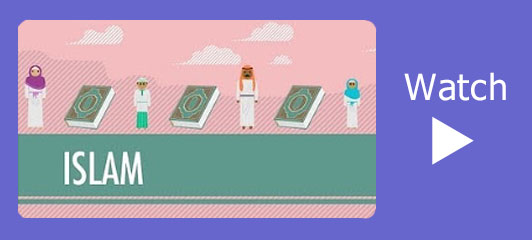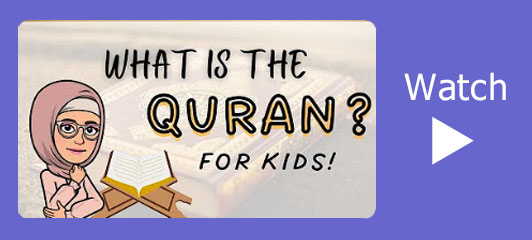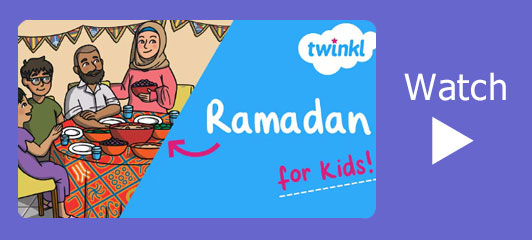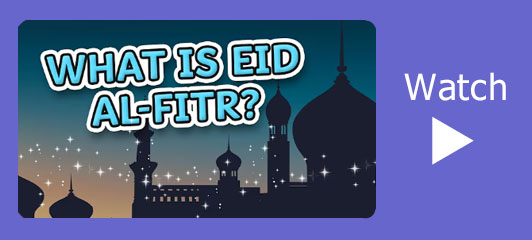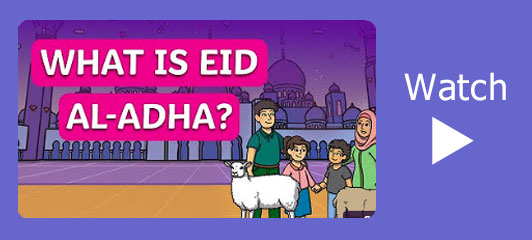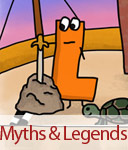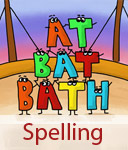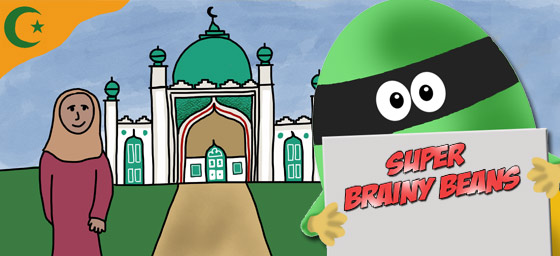
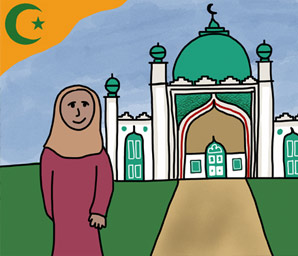
Islam
for kids
All about Islam for kids learning at Primary School. Homework help to find out what is Islam, how do they worship? Where do Muslims worship.
What is Islam?
Islam is one of the world’s great religions, followed by more than 1.9 billion people today. That’s nearly one in five people in the world! Islam began almost 1,500 years ago in what is now Saudi Arabia.
Islam was taught by the Prophet Muhammad. Muhammad was born in the city of Makkah (Mecca). As a man, he often went to the mountains to pray and think deeply about life. Muslims believe that one day, the angel Jibril (Gabriel) brought him messages from Allah (the Arabic word for God). These messages continued for the rest of his life and were later written down in the Quran, the holy book of Islam.
 What is Islam?
What is Islam?Learn all about the religion of Islam. Discover how Muslims observe the month of Ramadan and learn about Eid ul-Adha one of the most important festivals.
 Britannica Kids - Islam
Britannica Kids - IslamIslam is one of the world’s major religions. Its founder was Muhammad. The religion has more than 1.5 billion followers worldwide.
What is the symbol of Islam?
 The most well-known symbol of Islam is the crescent moon and star. You can often see this beautiful symbol on top of mosques, on flags of Muslim countries, and even in Islamic art.
The most well-known symbol of Islam is the crescent moon and star. You can often see this beautiful symbol on top of mosques, on flags of Muslim countries, and even in Islamic art.
The crescent moon represents progress and new beginnings, while the star stands for light and knowledge that guide people along the right path. Together, they remind Muslims that Allah’s guidance is like the moon and stars that help travellers find their way in the dark night.
Islamic beliefs
Muslims believe in one God, Allah, who is loving, merciful, and all-powerful. They follow the example of the Prophet Muhammad, who showed people how to live good and kind lives.
One important part of Islam is following the Five Pillars of Islam. These are five duties that every Muslim tries to follow:
- Shahadah – Belief in one God (Allah) and that Muhammad is His messenger.
- Salat – Praying five times a day.
- Zakat – Giving money or help to those in need.
- Sawm – Fasting during the holy month of Ramadan.
- Hajj – Travelling on a special pilgrimage to Makkah at least once in their life, if possible.
Muslims also follow special food rules. Food that is allowed is called halal. Muslims do not eat pork or drink alcohol, and animals must be treated kindly and prepared in a respectful way before being eaten.
How do Muslims worship?
 Muslims worship by praying to Allah five times a day – at dawn, midday, afternoon, sunset, and night. Before prayer, Muslims wash carefully in a special way called wudu to show respect and cleanliness. When it is time to pray, a man called a muezzin calls people to prayer from the mosque, often using a tall tower called a minaret.
Muslims worship by praying to Allah five times a day – at dawn, midday, afternoon, sunset, and night. Before prayer, Muslims wash carefully in a special way called wudu to show respect and cleanliness. When it is time to pray, a man called a muezzin calls people to prayer from the mosque, often using a tall tower called a minaret.
Prayers involve kneeling and bowing down, with the forehead touching the ground. This shows respect and humility before God. Wherever they are in the world, Muslims face towards Makkah when they pray.
Muslims also gather to worship in a mosque, which is a special place of prayer and learning. Before entering, everyone takes off their shoes to keep the mosque clean. Men and women usually pray in separate areas. Inside, there are no pews or seats like in a church — instead, people sit or kneel on soft carpets.
 Visit to a mosque
Visit to a mosqueMeet Hafeez as he shows you around his local mosque. Explore some of the features that can be found at a mosque.
Islamic ceremonies
New baby
When a Muslim baby is born, it is a time of great joy and thankfulness. Soon after birth, the baby’s father (or another close family member) gently whispers the call to prayer (adhan) into the baby’s right ear. This means the very first words the baby hears are about Allah (God), welcoming them into the faith. Sometimes, a small drop of sweet date juice or honey is placed on the baby’s tongue to wish them a sweet and blessed life.
Weddings
A Muslim wedding is called a Nikah, which means “marriage contract” in Arabic. The ceremony can take place in a mosque, a home, or a community hall. The bride and groom sign the Nikah papers in front of witnesses, showing their promise to love, respect, and care for one another. An imam (religious leader) or elder often gives a short talk and a du’a (prayer) asking Allah to bless the marriage.
After the ceremony, family and friends celebrate with music, dancing, and delicious food — often traditional dishes from the couple’s culture. Gifts are given, and everyone wishes the couple a happy life together.
Funeral services
When a Muslim passes away, their family and friends treat the body with great care and respect. The body is washed and wrapped in a plain white cloth (called a kafan), showing that everyone is equal before God. Muslims are buried as soon as possible, usually within 24 hours, and the body is placed so that it faces Makkah, the holy city.
A special funeral prayer called Salat al-Janazah is said, where everyone prays for the person’s soul and asks Allah to grant them peace in the afterlife. After the burial, family and friends may read from the Quran, share memories, and support one another in their grief.
What is the Quran?
The Quran is the holy book of Islam. Muslims believe it is the exact word of God, revealed to the Prophet Muhammad in Arabic. It contains guidance about how to live a good life, how to worship, and how to care for others.
The Quran is always treated with great respect. Muslims often keep it on a high shelf or wrap it in cloth. When reading it, they use a stand called a rihal and wash their hands first. Children often learn verses from the Quran in Arabic, even if they speak another language at home.

What is the Hajj?
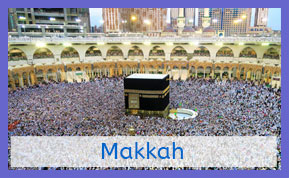 Hajj is a very special journey, or pilgrimage, that every Muslim hopes to make once in their lifetime if they are able to. It takes place every year in the holy city of Makkah, in Saudi Arabia — the birthplace of Islam and the Prophet Muhammad.
Hajj is a very special journey, or pilgrimage, that every Muslim hopes to make once in their lifetime if they are able to. It takes place every year in the holy city of Makkah, in Saudi Arabia — the birthplace of Islam and the Prophet Muhammad.
During Hajj, millions of Muslims from all around the world travel to Makkah to worship together. Everyone wears simple white clothes, called ihram, to show that all people are equal before Allah, no matter who they are or where they come from.
The pilgrimage lasts for five days and includes several important events. One of them is walking seven times around the Kaaba, a large cube-shaped building in the centre of the Great Mosque. Muslims believe the Kaaba was first built by the Prophet Ibrahim (Abraham) and his son Ismail as a place to worship God.
Another part of Hajj is standing together on the plain of Arafat, praying and asking Allah for forgiveness. Pilgrims also throw small stones at three stone pillars to remember how Ibrahim resisted temptation from the devil.
At the end of Hajj, Muslims around the world celebrate Eid ul-Adha, also known as the Festival of Sacrifice. It is a time of thankfulness, sharing food, and helping the poor.
Islamic Festivals
Ramadan
Ramadan is a very special and holy month for Muslims. During this time, Muslims fast from sunrise to sunset every day. Fasting means not eating or drinking during daylight hours. It helps Muslims learn self-control, patience, and empathy for those who have less. After the sun sets, families and friends come together to share a meal called iftar, which often begins with dates and water. Ramadan is also a time for extra prayer, kindness, and helping those in need.
Eid ul-Fitr
Eid ul-Fitr, also known as the Festival of Breaking the Fast, marks the joyful end of Ramadan. On this day, Muslims thank Allah for giving them strength during their fasting. People wear new or best clothes, decorate their homes, and share delicious meals with family and friends. Before the celebrations begin, Muslims give charity (called Zakat al-Fitr) to help those in need, so everyone can enjoy the day together. Children often receive gifts, money, or sweets, and the day is filled with happiness, laughter, and community spirit.
Eid ul-Adha
Eid ul-Adha, known as the Festival of Sacrifice, takes place at the end of the Hajj — the great pilgrimage to Makkah. It remembers the story of the Prophet Ibrahim (Abraham), who was willing to sacrifice his son to show his obedience to God. Because of his faith, Allah provided a ram instead. To remember this act of devotion, Muslim families share a special meal, and meat is often divided into three parts — one for the family, one for relatives, and one for the poor. It is a time of faith, generosity, and thankfulness.
Famous Muslims
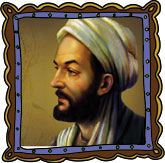
Ibn Sina (980–1037)
Ibn Sina, also known in the West as Avicenna, was a brilliant Muslim scholar who lived over 1,000 years ago. He made many important discoveries in medicine, science, and philosophy. His medical book, The Canon of Medicine, was used in Europe and the Middle East for hundreds of years. Ibn Sina’s work helped doctors understand the human body and how to treat illnesses. He is remembered as one of the most important scientists in history.
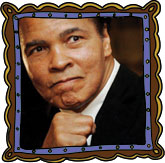
Muhammad Ali (1942–2016)
Muhammad Ali was one of the most famous boxers the world has ever known. He was a Muslim who was proud of his faith and often used his fame to speak out for peace, justice, and equality. Ali was not only known for his boxing skill, but also for his courage in standing up for what he believed was right. Even after he retired, he worked to promote charity, kindness, and unity. People still call him “The Greatest.”
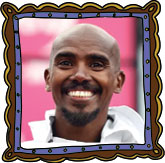
Mo Farah (1983– )
Sir Mo Farah is a British Muslim athlete and one of the greatest long-distance runners in history. He won four Olympic gold medals for Great Britain in the 5,000 and 10,000 metres. Mo was born in Somalia and moved to the UK as a child. He has spoken about how his faith in God gives him strength and discipline, both in training and in life. Many people admire him not only for his incredible speed, but also for his kindness and positive spirit.

Malala Yousafzai (1997– )
Malala is a young Muslim woman from Pakistan who became world-famous for standing up for girls’ right to go to school. When she was only a teenager, she was attacked by people who didn’t want girls to have an education, but she survived and continued to speak out bravely. Malala became the youngest person ever to win the Nobel Peace Prize in 2014. Today, she travels the world inspiring millions of people with her message of peace, education, and equality.

